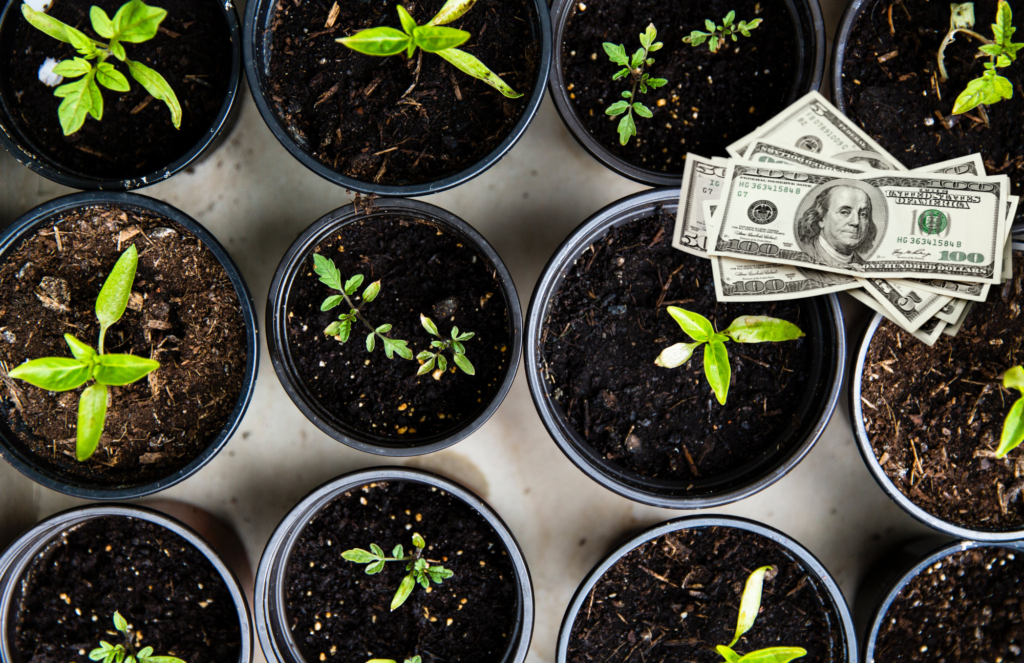How To Use Your Gardening Skills To Generate Side Income

This post may contain affiliate links. When you click and purchase from any of our links, we may get a small commission at no extra cost to you. For more information, please see our affiliate disclosure.
So, you’re a gardening whiz, right? First things first, pin down what you’re amazing at. Are your tomatoes the talk of the neighborhood, or do folks rave about your rose bushes? Figuring out where your gardening mojo lies is the first step to turning those skills into cash.
Once you’ve got a grip on your strengths, it’s time to scout out the market. What’s selling like hotcakes, and where? This could be fresh produce at your local farmers’ market or an online store selling potted plants. Get the lowdown on what consumers are craving right now so you can cater to their needs effortlessly.
Knowing what people are after is key. For instance, if there’s a trend towards organic veggies, maybe it’s time to flaunt your pesticide-free zucchini. Consumer preferences can change with the seasons or trends, so keep those ears to the ground.
Lastly, gauge the demand. Are people willing to spend on what you grow? This could save you from a ton of trial and error. Check out local community boards or online marketplaces to see who is buying what, and how much they’re willing to fork out.
Transforming Your Garden’s Produce into High-Value Products
Got an overabundance of herbs or a garden full of flowers? Think outside the box with what you can create from those little green wonders. Dried lavender sachets, mint tea blends, or herbal-infused oils might just be your new jam in the neighborhood.
It’s not just about what you grow, but what you can make from it. Homemade jams from your berry shrub or a chili sauce from those fiery peppers could turn into crowd favorites. The idea is to elevate your garden gifts into artisanal creations that people can’t resist.
Branding isn’t just for global corporations. Your garden-fresh products need an identity too. A catchy name, simple logo, or a small backstory can make all the difference. Make what you offer not just a product, but an experience—something folks will want to come back for again and again.
Think about the packaging. It’s not just what’s inside that counts. Going for eco-friendly options can not only look good but make the environmentalists among us super happy. Plus, a neat and creative package makes your product stand out in a crowded market.
Profitable Gardening Side Business Ideas for Your Local Community
Starting a gardening business locally can be a rewarding way to combine your passion for plants with a profitable venture. Here are some ideas you could explore:
- Lawn Care and Maintenance
Offer regular lawn mowing, trimming, fertilization, and weeding services to homeowners or businesses in your community. It’s a consistent service that many people need year-round. - Garden Design and Landscaping
Help homeowners create beautiful outdoor spaces by offering custom garden designs. This could include planting flowers, shrubs, and trees, installing hardscapes, or even designing water features. - Plant Sales
Grow and sell plants from your garden, such as flowers, herbs, vegetables, or indoor plants. You could sell directly to local customers or set up a booth at farmer’s markets. - Organic Produce Delivery
If you have a vegetable garden, offer a subscription-based service where you deliver fresh, organic produce to local customers on a weekly or monthly basis. - Garden Clean-Up Services
Offer garden clean-up services to homeowners, which includes removing dead plants, pruning overgrown bushes, or cleaning up garden beds after the growing season. - Garden Consultation and Education
Become a gardening consultant for local homeowners or businesses looking to improve their garden spaces. You could also host gardening workshops or classes to teach others how to grow their own plants and vegetables. - Specialized Plant Care
Offer care for specific types of plants, such as orchids, succulents, or bonsai trees. You could even offer indoor plant care services for clients who want their plants to thrive. - Event Floral Design
Use your gardening skills to provide floral arrangements for local events like weddings, parties, or corporate functions. You could offer both custom floral designs and rental services for arrangements. - Vertical Gardens and Indoor Plant Installations
Install vertical gardens or other indoor gardening solutions for clients who want to maximize space in their homes or businesses. This could include green walls, hanging gardens, or small-scale herb gardens. - Composting Services
Help customers reduce waste and improve their garden soil by offering composting services. You could provide bins, pick up organic waste, and even offer to deliver finished compost back to their gardens.
Each of these ideas allows you to leverage your gardening knowledge while serving the local community, creating a business that provides value and meets specific needs. Now let’s talk about how to branch and reach to customers further than your own community!
Optimizing Online Platforms to Expand Your Market Reach
Social media isn’t just for selfies—it’s your garden’s best friend too. Flash those floral arrangements or that sweet new batch of organic goods on Instagram, and watch the likes (and sales) roll in.
Creating a visual treat with your posts keeps folks engaged. Stylized shots of produce or time-lapse videos of your garden progress could be the perfect fit for Instagram and Pinterest. Pick platforms where your products look their best.
Companies That Can Help You Grow Your Online Business:
- Etsy
Etsy is an incredible platform for gardeners looking to sell handcrafted, garden-inspired goods. Whether you’re offering potted plants, homemade herbal teas, or garden décor, Etsy is perfect for showcasing your creative products. The platform allows you to connect directly with eco-conscious consumers who appreciate artisan-quality goods. It’s a marketplace that thrives on handmade and unique items, so your garden creations will be right at home. - Shopify If you’re ready to build your own online store and take full control of your branding, Shopify is a fantastic option. From selling seeds to gardening tools or even flower arrangements, Shopify lets you create a polished online store with ease. Its integration with payment systems, shipping, and marketing tools makes it an excellent choice for business owners looking to expand their online presence.
- Blogging Wealthy Affiliate’s blogging program can be an excellent way to turn your passion for gardening and tools into a profitable side business. By providing step-by-step training on how to build a blog, optimize content, and monetize it through affiliate marketing, Wealthy Affiliate helps you reach an audience interested in gardening tips, tools, and products. With the right guidance, you can create a niche blog that attracts visitors and generates income through product recommendations, affiliate links, and partnerships with gardening brands. It’s a great way to combine your gardening knowledge with a sustainable income stream. For more information about this company, check it out here.
- Instagram & Pinterest
Social media can be a game-changer for promoting your gardening business. Instagram allows you to share photos and videos of your garden products, and with its shopping features, you can let customers buy directly from your posts. Pinterest is another great visual platform for gardening businesses, allowing you to create boards for inspiration, tutorials, and product sales. Both platforms help boost visibility and reach a large audience that loves all things green. - Squarespace
For a beautifully designed website with minimal effort, Squarespace is ideal. You can easily create an online presence to sell your garden products, share your gardening knowledge, or promote upcoming workshops. The sleek, customizable templates will ensure your business looks professional, and it’s perfect for those who want to sell products, provide services, or share gardening tutorials. - EarthEasy
For gardeners interested in sustainability and eco-friendly products, EarthEasy is a go-to online marketplace. They offer a variety of gardening supplies, from raised garden beds to composting solutions and rainwater harvesting systems. Selling products that are aligned with EarthEasy’s eco-conscious philosophy can help you attract customers who are serious about sustainable gardening and reducing their environmental footprint. - SeedsNow
If you’re passionate about heirloom seeds or want to sell your own seed collections, SeedsNow is a fantastic resource. They offer a wide range of seeds for all kinds of plants, and you can partner with them to grow your business by offering rare or heirloom varieties. SeedSavers not only provides products but also educates consumers about the importance of biodiversity in gardening. Check out more about this amazing company: SeedsNow. - Hydrofarm
If your business involves hydroponics or indoor gardening, you are going to want to check out Bootstrap Farmer as it offers the tools and resources you need. They’re a leading supplier of hydroponic systems, grow lights, and nutrient solutions. Hydroponics is becoming increasingly popular among gardeners who want to grow indoors or maximize their space, and partnering with a company like Bootstrap Farmer helps you tap into that growing market.
Why You Would Want to Purchase from These Companies
These companies offer high-quality, sustainable, and innovative products that meet the growing demands of today’s eco-conscious and tech-savvy gardeners. From hydroponic kits to heirloom seeds, these businesses cater to a variety of gardening needs. By partnering with or using products from these companies, you’ll be able to provide your customers with the best supplies while enhancing your business’s credibility and reputation.
Networking and Community Engagement: Building Your Reputation
Local markets and fairs are goldmines for making connections. Meet other gardeners, get inspired by their ideas, and swap stories. Plus, customers love buying directly from the person whose hands got dirty growing the goods. Partnering up with fellow green thumbs or local artisans can open up new avenues. Think bundle deals at markets or collaborative online giveaways. There’s strength in numbers and working together might just lead to more customers and fun ventures. Got knowledge to share? Hosting workshops lets you flex your expertise on plants while connecting with eager learners. It’s a win-win—spread gardening wisdom and make a name for yourself as a guru. Offering one-on-one garden advice or even setting up bespoke gardening plans can turn your passion into profit. Personal service makes a strong impression, keeping clients coming back for more guidance and goods.
With a combination of clever branding, strategic partnerships, and the right online platforms, you can take your gardening passion and grow it into a successful business. By leveraging the tools and resources from companies like EarthEasy, SeedsNow, and Bootstrap Farmer, your business can thrive in today’s green-thumb economy.







Hi,
Loving the vibe of your garden-to-goodies transformation, turning those herbs and flowers into high-value products is pure genius. Have you thought about creating a signature product that could become your brand’s hallmark? Maybe a unique blend of herbal tea or a one-of-a-kind infused oil? Also, what’s your take on eco-friendly packaging?
Jay,
What a great idea: creating a signature product for your brand could really set you apart in the market and give customers something unique to connect with your brand. A signature product helps build brand identity, and it can make your shop or website stand out. I can see myself offering a garden-inspired tea blend using seasonal flowers, herbs, or even fruit from my garden. I could create blends for specific benefits, like calming chamomile-lavender or energizing mint-lemon balm. I have several herbs that I am growing such as lavender, rosemary, and basil and that got me thinking about what you said: one-of-a-kind infused oil! So maybe a lavender-infused olive oil! Love this idea! Or maybe a signature soothing lavender-rose soak for an herbal bath. Thank you for your suggestion!
As for eco-friendly packaging, I know that more and more consumers are prioritizing sustainability in their purchases. Using recycled, biodegradable, or compostable materials for your packaging signals that you align with the values of those looking to reduce their environmental footprint. For instance, using kraft paper, glass jars, or biodegradable pouches can make your products feel premium yet responsible.
I also believe that using eco-friendly packaging is a key point of differentiation in an increasingly crowded market. Beautiful, sustainable packaging will make your products more memorable and help create a cohesive brand identity that customers can identify with. Plus, sharing your sustainable packaging story on social media or on your website could help create an emotional connection with your customers.
I have received wonderful handmade items in beautiful eco-friendly packaging from companies that brought that extra touch of love, creativity, and warmth. I truly believe that important detail spurred me on to ordering more! Customers love knowing that their purchase is contributing to something bigger than just buying a product!!
This article has some great tips for turning gardening skills into a profitable side hustle! I’m curious about how people get started in terms of pricing their homemade products—what’s the best way to figure out what to charge for things like herbal oils or jams? Also, I love the idea of building a personal brand around your garden’s story, but how can someone without much marketing experience get started with branding effectively? Would love to hear more on these points!
Zachary, the best way to figure out pricing for your products is to do local market research on where you will be selling. You can do a simple Google search to find out what are the pricing points for similar products in your area. This way you can gauge what the market will tolerate or what people are willing to pay.
As to creating a brand. We have found that with the advent of social media, you can start your brand and build it very easily. Simply tell people what you are doing, be honest, and show some excitement. Clients are attracted to authenticity and they want to support start-ups in their area. You have to tell to sell.
This is such an inspiring read! I love how gardening can be more than just a hobby—it can actually become a fulfilling and profitable side business. I’ve always believed that turning something you love into an income stream is one of the best ways to build financial stability while staying passionate about what you do.
The idea of transforming homegrown produce into value-added products really resonates with me. I’ve seen firsthand how homemade jams, herb-infused oils, and even simple potted plants can attract eager buyers, especially when presented with a strong brand and eco-friendly packaging.
I also appreciate the emphasis on online platforms like Etsy and Shopify. Social media has been a game-changer for many small businesses, and I can see how it would work wonders for gardeners looking to reach a wider audience.
Have you seen any particular gardening niches or trends that are especially profitable right now? I’d love to hear what’s working for others! Thanks for sharing these valuable insights!
Alice!
Through my research, I have found the following as trends lately when it comes to gardening:
There’s a growing interest in sustainable gardening practices, such as organic gardening, permaculture, and water-saving solutions. People are increasingly looking for ways to reduce their environmental impact so profitable opportunities would include selling organic fertilizers, composting systems, rainwater collection systems, and eco-friendly tools.
With many people spending more time indoors or having small spaces, houseplants have experienced a surge in popularity. Indoor gardening, including the cultivation of small space plants, succulents, and air-purifying plants, is thriving so I have found selling rare or trendy plants (e.g., Monstera, Fiddle Leaf Fig), indoor planters, and grow lights can be lucrative.
Hydroponics (growing plants in water with nutrient solutions) and aquaponics (a symbiotic system combining fish and plants) are becoming more common for those who want to grow food indoors or in non-traditional spaces so I believe there is a market for selling hydroponic systems, grow lights, nutrients, and aquaponic setups.
If you’re thinking of getting into the gardening business, focusing on one of these growing niches could be a profitable venture and I would totally check these options out! Let me know which sounds interesting to you!
This post is packed with valuable insights for anyone looking to turn their gardening passion into a profitable venture! It breaks down key steps like identifying strengths, understanding market demand, and transforming garden produce into high-value products. The emphasis on branding, packaging, and utilizing online platforms like Etsy and Shopify is particularly useful for those wanting to expand their reach beyond local markets. I also love the focus on networking and community engagement—building relationships with fellow gardeners and customers is essential for long-term success. The section on partnering with companies like SeedsNow and EarthEasy adds another layer of credibility and opportunity for growth. Whether you’re selling fresh produce, offering landscaping services, or creating artisanal garden products, this guide covers it all. With the right strategy, any green thumb can turn their hobby into a thriving business. Thanks for sharing such a comprehensive and inspiring post!
Thank you for your thoughtful and encouraging words! It’s great to see how much you resonated with the post, especially when it comes to branding, online platforms, and community engagement—those aspects can truly make a difference in turning a gardening passion into a sustainable business.
One key piece of advice I’d add is to start small and test your market before scaling up. Whether it’s a specific product, service, or niche within gardening, experimenting with a few offerings first can help you refine your approach based on customer feedback and demand. This way, you can grow strategically while minimizing risk.
Wishing you all the best in your gardening business journey—keep nurturing those green dreams! ????✨